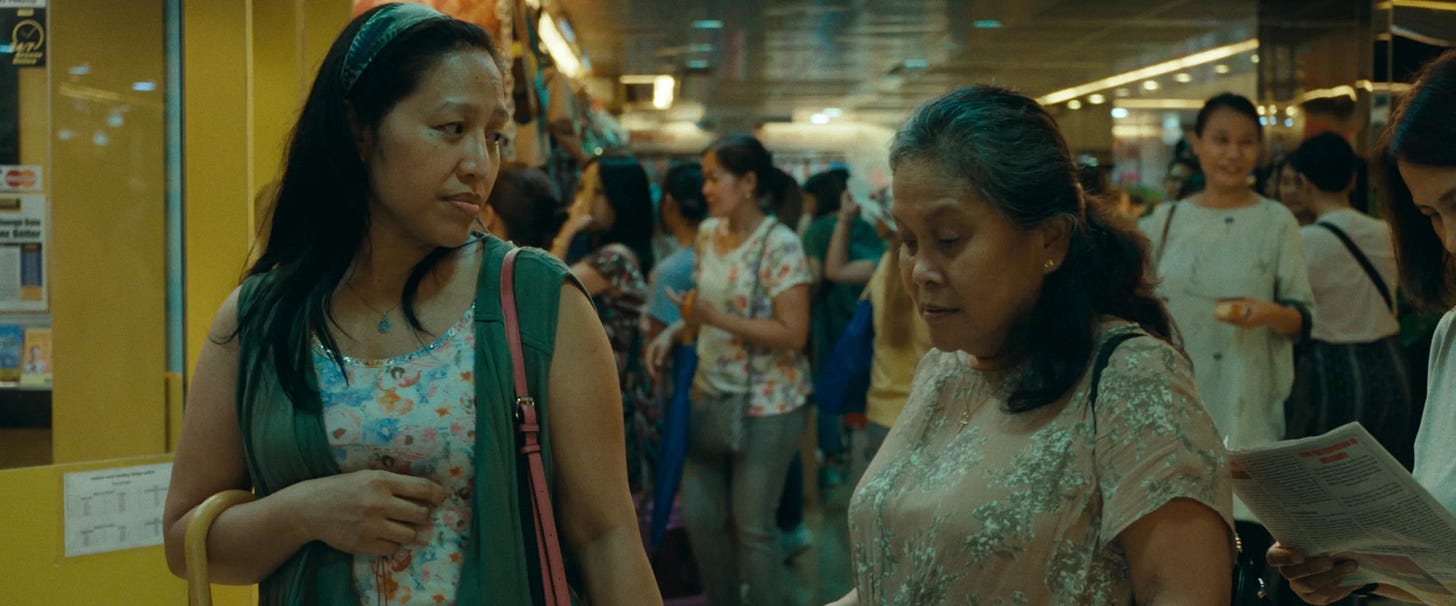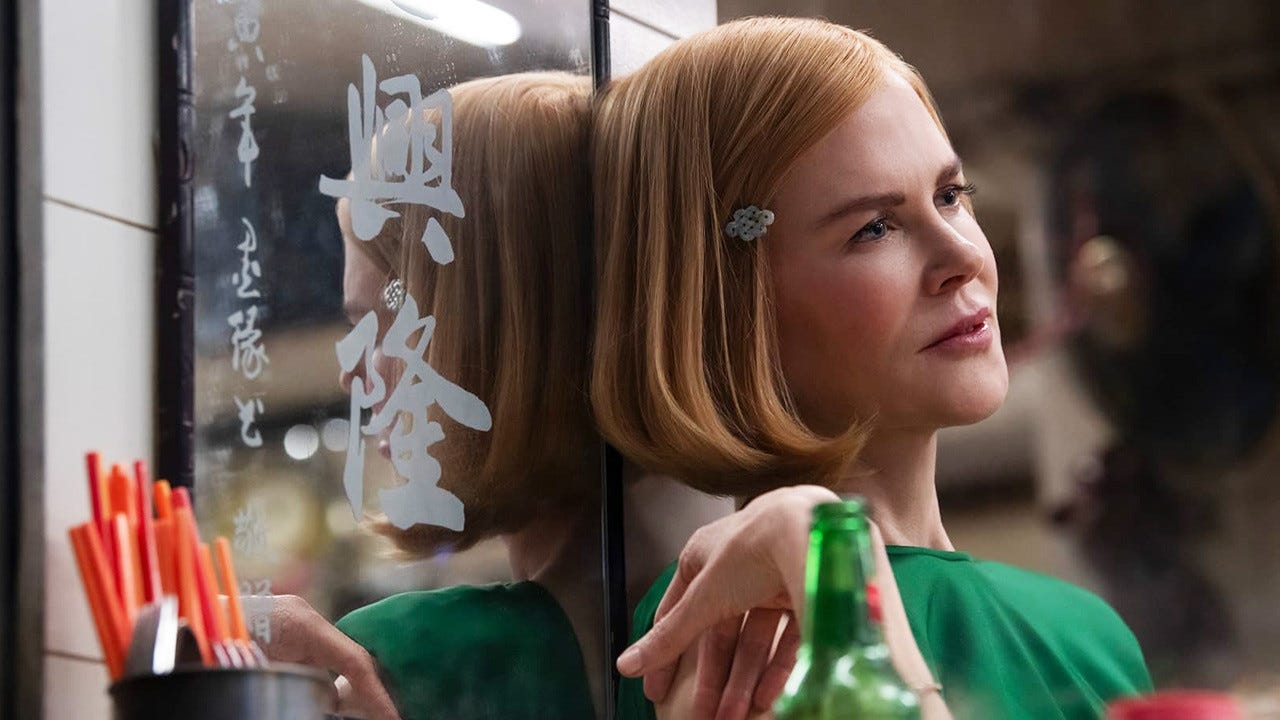The New ‘Very Special Episode’ and ‘Expats’
A small but unfortunate trend in TV shows is the Lower Decks episode that focuses on the plebs for inclusivity points.
NEW STANDARD DISCLAIMER: This newsletter aggressively spoils things.
Expats on Amazon Prime is a curious show in which Nicole Kidman’s oddly frail body1 is often disturbing and 2014-era Hong Kong looks like a hellscape we should be glad China took on from the United Kingdom (it’s also part of the burgeoning “mommythriller” genre). It’s a ponderous story based on the novel Expatriates by Janice Y.K. Lee, and it’s one of those stories that presents you with a mystery it never intends to solve2, which is either your jam or isn’t. In this case, the mystery is the disappearance of Gus, Margaret’s (Kidman) young son, who vanishes from a night market after Margaret asks a young woman she’s just met (Mercy, played by Ji-young Yoo) to watch him.
But the story isn’t really about Gus’s disappearance. It’s about the titular expats—Margaret, Mercy, and Margaret’s friend Hilary (Sarayu Blue). Each woman is dealing with loss. Margaret’s loss of Gus is the most horrifying, but Hilary is struggling with the end of her marriage, and Mercy is suffocating under her self-hatred over losing Gus.
All three women enjoy a version of very real privilege. Margaret and Hilary are wealthy—their husbands are high-earners, and they live an elite existence in a Hong Kong high-rise, complete with servants and drivers3. Mercy is poor as dirt, but she’s an American citizen who is, in a way, slumming it in Hong Kong—as a character points out later in the narrative, she can leave any time she wants. In other words, she’s not a servant—she works catering jobs and has zero money, but she’s not like the Filipino and Thai women who work jobs as domestics in Hong Kong, who would be in real trouble if their wealthy patrons fired them or refused to give them a reference4. She has more choices.
Margaret and Hilary live in a world supported by servants. They’re not bad people, per se; they are self-involved and casually cruel to the people they pay, but they aren’t purposefully mean to them5. And the workers who make their easy lives possible lead us to one of the most pernicious developments of modern-day television: The re-imagined Very Special Episode that is all about acknowledging the fact that Poors exist.
What’s Your Name Again?
If you’re a Young, you might not be aware of the Very Special Episode phenomenon6. Back in The Day, situation comedies and lighter dramas would occasionally script an episode that tackled a current or evergreen social issue—alcoholism, or child abuse, or the danger of role-playing games luring your children into Satanism7. Out of nowhere, a frothy comedy would suddenly lean into a dramatic 20 minutes or so, often capped with a message informing the audience of pertinent statistics or 1-800 numbers they could call for help. The producers would usually tout these moments as evidence that they were not in actuality Lizard People sucking money and lifeforce from us all, but rather human beings who actually cared about their fellow sapiens8.9
The Very Special Episode faded from relevance around the same time broadcast television did, but the concept lives on today, mainly in the form of shows that know they need to highlight some diversity. Episode Five of Expats is a prime example: It takes a break from our privileged, wealthy main characters and spends much of its time following their servants, mainly Margaret’s nanny-cum-housekeeper Essie (Ruby Ruiz) and Hilary’s housekeeper Puri (Amelyn Pardenilla). The whole point of the episode is to highlight the fact that these people actually exist and their needs and desires matter as much as anyone else’s, so the show can get back to caring about the needs and desires of their betters as quickly as possible10.
You’ve seen this move before. The sixth episode of Master of None’s second season, “I Love You, New York,” was totally focused on a bunch of gig workers with only a glancing appearance by the show’s main cast. While Master of None wasn’t about super rich folks11, Aziz Ansari’s Dev was the son of a doctor, and lived a pretty decent life as a struggling actor in New York, so he wasn’t exactly poor. The decision to give over an hour of screen time to a bunch of struggling immigrants was laudable—don’t get me wrong, those stories deserved to be told, and the episode itself is entertaining and worth watching. But it’s entire reason for existence is a Very Special reminder that everyone involved in the show are not assholes because they remembered that these people exist, in their way.
Very Special
Of course, there’s narrative value in deep-diving into minor characters. While the Master of None episode doesn’t include any characters who appear elsewhere in the series, it’s easy to argue that the deep dive into supporting characters in “Central,” who factor into the larger narrative in various ways, embiggens the universe of the story and offers opportunities for insight12.
But it can’t be denied that one of the main effects of the episode is to superficially explore the world of characters who are denied any sort of agency in the larger narrative. Their stories could be woven into the rest of the plot, presented with equal weight with Margaret, Hilary, and Mercy’s13. Instead, they’re all crammed into this one episode and presented as a special effort for the credit, while allowing the show to get back to its regularly scheduled programming unencumbered by such concerns. You can’t say they ignored their existence, after all.
You have to think critically, because writers (and showrunners) will absolutely lie to you, gaslight you, and dissemble in your general direction14. We make decisions about what gets on the page or screen and when, and it’s always worth asking yourself why we made those decisions, and why we couldn’t make different ones15.
Then again, the idea of having someone in my house doing things for me is so terrifying it transforms any story involving servants into a horror story, so I might be a bit biased here16. Also: Clearly a pleb.
NEXT WEEK: The Regime sets a land speed record for ridiculousness.
If you enjoy this newsletter, consider subscribing to my paid fiction Substack, Writing Without Rules: From the Notebook!
At this point if you told me Kidman had her head removed and placed on an animatronic of some sort back in 2010, I’d believe it.
Sort of like when I ask “Who drank all the beer?”
Soooo many shows depict this kind of wealth as kind of normal, which has to be brewing some kind of modern revolutionary movement, right? I mean, Chicken McNuggets are now like $50 a nugget.
Meanwhile, whenever I hire someone to do something for me, like fix my roof, I feel the need to offer them lunch and endless praise for fear that they will turn against me and destroy my life. I’d much prefer to be wealthy.
This is also a perfect description of my cats’ attitude towards me.
The other day I caught 30 seconds of Independence Day on TV and it was Harry Connick, Jr. doing a Jesse Jackson impression and I thought, shit, no one under 30 understands any of this. Or knows who Harry Connick, Jr. is.
When I was 12 my father drunkenly forbade me to play D&D because of the Satanic Panic going on, and although I didn’t have the words yet this was definitely my first Okay, Boomer moment.
Or at least our continuing ability to purchase deep fried tacos embedded in burritos wrapped in pizzas with a name like GORGAMUNCHOS or something.
True talk: I would 100% eat anything called Gorgamunchos.
These are people who regard their careers as fulfilling ways to make their lives meaningful instead of, you know, horifying ways to sell your time in exchange for food pellets and shelter.
It was merely about Normal Level Rich folks. For calibration purposes, I myself am Normal Level Feeding Myself.
One of those main insights: Working for rich people totally sucks.
After all, the story admits that Essie, who has more or less raised Margaret’s kids, is suffering just as much emotional turmoil as Margaret. And, having acknowledged that, the show promptly ignores it.
For example, I totally did contact demons using my D&D paraphernalia as a kid. Don’t tell Dad.
In my case the answer is usually that I was too lazy and/or hungover to go back and revise.
No one washes my dirty underwear but me. NO ONE CAN KNOW MY SHAME.







You drank all the beer, Jeff. You did.